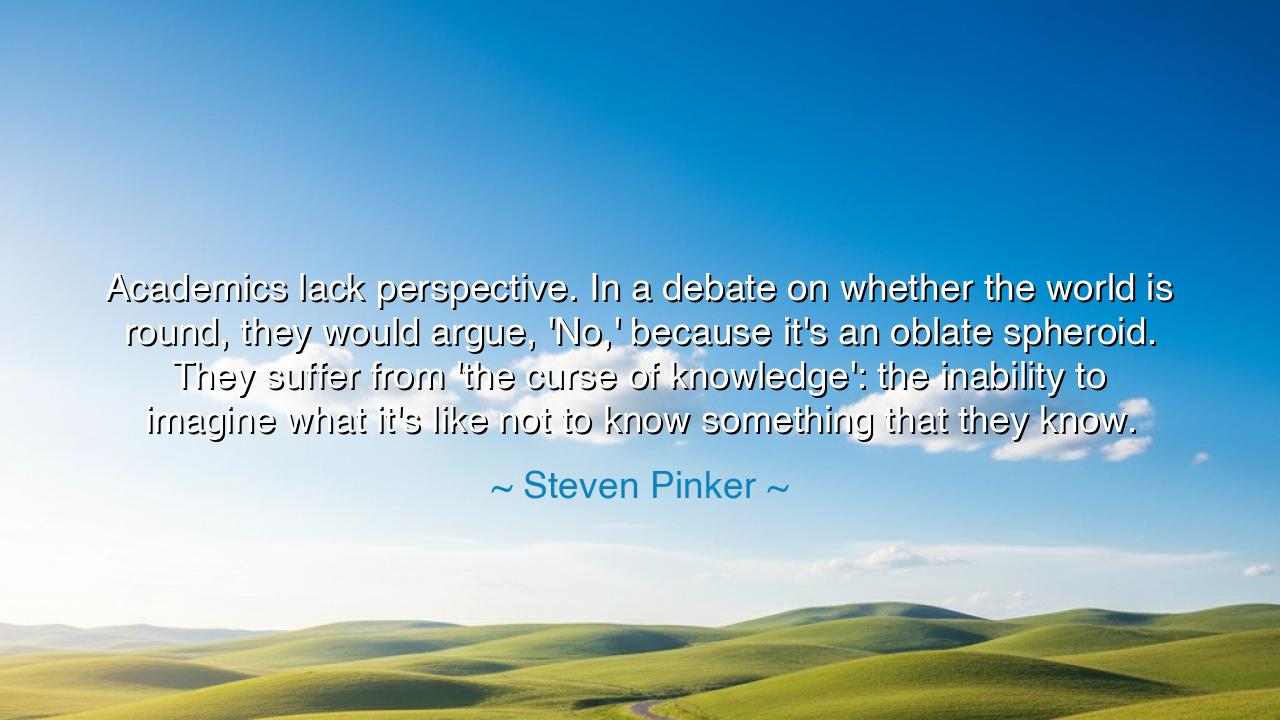
Academics lack perspective. In a debate on whether the world is
Academics lack perspective. In a debate on whether the world is round, they would argue, 'No,' because it's an oblate spheroid. They suffer from 'the curse of knowledge': the inability to imagine what it's like not to know something that they know.






In the discerning and thought-provoking words of Steven Pinker, the scholar of language and the human mind, we find a mirror held up to the world of intellect itself: “Academics lack perspective. In a debate on whether the world is round, they would argue, ‘No,’ because it’s an oblate spheroid. They suffer from ‘the curse of knowledge’: the inability to imagine what it’s like not to know something that they know.” These words, though wrapped in wit, carry the weight of deep wisdom. They remind us that even knowledge — that radiant torch of human progress — can cast shadows when it blinds us to humility.
The origin of this quote lies in Pinker’s long study of how the human mind communicates and miscommunicates. As a psychologist and linguist, he has explored the ways in which thought becomes tangled in the limits of language. In this reflection, he observes a paradox: that those who know the most often forget what it is like to know little. The curse of knowledge, as he calls it, is not ignorance but its opposite — the failure of the learned to remember the perspective of the unlearned. It is a failure of empathy in the realm of intellect, a blindness caused by the brilliance of one’s own understanding.
To say that academics lack perspective is not to scorn learning, but to remind the wise that wisdom without compassion is sterile. When Pinker mocks the pedant who insists that the earth is not “round” but an “oblate spheroid,” he exposes a deeper flaw — the tendency to value precision over connection, correctness over clarity. Such a scholar may win the argument, yet lose the listener. For what is knowledge if it cannot be shared, what is truth if it cannot be understood? Thus, Pinker’s lesson is timeless: that the purpose of wisdom is not to elevate oneself above others, but to illuminate the path for all.
We see this truth reflected in the story of Socrates, the greatest teacher of ancient Athens. Though wise beyond his peers, he called himself ignorant, knowing that the first step to understanding was humility. He did not lecture from a pedestal, but questioned in the marketplace, drawing forth wisdom from the mouths of ordinary men. Unlike the scholars Pinker describes, Socrates understood that to teach is not to display knowledge but to awaken it in others. He knew that the mind must descend from the heights of intellect to meet the soul where it stands. In this way, he escaped the curse of knowledge — for he remembered always what it was like not to know.
This “curse” is not confined to scholars or scientists; it lives in every human heart that forgets compassion. The parent who cannot recall the confusion of childhood, the expert who cannot explain to the beginner, the leader who cannot feel the struggles of those he governs — all are victims of this blindness. To know something is a gift, but to remember what it felt like not to know is a greater one. For only then can knowledge be translated into wisdom, and wisdom into guidance. The wise man, therefore, must hold in his heart both mastery and mercy.
In Pinker’s example of the oblate spheroid, we see the comedy of intellect taken too seriously. It is the scholar’s tragedy — to be right in words but wrong in spirit. The world does not need more pedantry; it needs understanding. The child who says the earth is round speaks truth enough for her age, and to correct her with technicality is to miss the moment of wonder. This, then, is the balance all seekers of truth must learn: precision must serve meaning, not obscure it. For truth, like light, should illuminate, not dazzle.
So let this lesson pass down as a lamp to all who learn and teach. Be not trapped by the curse of knowledge; remember the path you once walked from confusion to clarity. When you speak, speak not to impress, but to uplift. When you teach, remember the joy of your own discovery. Let humility temper intellect, and empathy refine reason. For the greatest wisdom is not in knowing the most, but in understanding how to share what you know.
Thus, Steven Pinker’s words stand as a quiet warning to all generations: that the scholar must never forget the student, nor the learned forget the learner. Knowledge is a river — its purpose is to flow, to nourish, to give life. But if it pools in pride, it becomes stagnant. Therefore, let your mind be deep, but your heart be wide. Seek truth, yes — but seek also to make it known, that others may drink from it and rise with you into the light.






AAdministratorAdministrator
Welcome, honored guests. Please leave a comment, we will respond soon